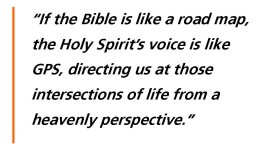Discovering a Life Worth Living

 “If the Lord were to grant you the answer to one question, what would you ask?” Paul Little offers this challenge in his article, “How Good is God’s Will?” in the June 1982 issue of InterVarsity’s HIS magazine. What he concludes is that such a question would probably express our need to receive God’s guidance.
“If the Lord were to grant you the answer to one question, what would you ask?” Paul Little offers this challenge in his article, “How Good is God’s Will?” in the June 1982 issue of InterVarsity’s HIS magazine. What he concludes is that such a question would probably express our need to receive God’s guidance.
Why do Christians believe that knowing God’s will is so important? Well, to begin with, Christians have historically asserted that the entire world is under the sovereignty of God. And because, as the Bible teaches, God is good and loves us and intends the best for our lives, our personal desires are less important than our living as God intends; a life pleasing to God is our highest good—indeed, the purpose of our existence. So knowing God’s will affects our choices, from where we enroll in college to why we return the nickel to a clerk who undercharged us.
Knowing God’s will not only relates to heavenly things, such as our receiving eternal life through Jesus Christ, but also pertains to the everyday events that seem as insignificant as the flutter of a butterfly’s wings. Within a Christian worldview, everything every day is significant under the sovereignty of God.
Discovering God’s Will in His Word
How do Christians discover the will of God? Frankly, knowing God’s will is more a result of reasonable intelligence than of personal, spiritual experiences. The simple truth is that God guides Christians in primarily two ways—through the Bible and through the Holy Spirit.
In the Bible we learn about how God worked—and in many respects still works—through nature (by secondary causes), the descendents of Abraham, the historical God-man Jesus Christ, and the Church to reveal his purposes for all creation. In the Bible we find God’s revelation of hope and redemption. And in the Bible we discover ourselves, beautiful yet flawed, saved by Christ from eternal death and called to loving service and a new life worth living.
Reading the Bible is often the first step for many people, Christians and non-Christians alike, in knowing God’s guidance for their fragile lives. As the Holy Spirit illumines Scripture and we apply its lessons to our daily decisions, we grow more sensitive in discerning the will of God.
God’s guidance also grows within us through the preaching and the teaching of God’s Word. Throughout the history of the Church, dedicated Christians have passed to younger generations biblical truths through sermons, books, confessional statements and creeds, and even through works of art, thus preserving much of God’s guidance for humanity. Such expressions of faith have both ensured the Church’s doctrinal memory and pointed the way toward the fulfillment of God’s redemptive story.
 Today, God’s Spirit continues speaking to us through the Bible, the Church’s history, and the preaching and teaching of other Christians. All these means of receiving God’s Word educate our minds, so that when the need arises for God’s intimate guidance in our lives, we are already familiar with his ways and voice, particularly when we approach those intersections of life where we’re not sure whether to pause or proceed, whether to turn one way or another. At such times, we need more than a map; we need directions from above. So, loosely speaking, one might say that if the Bible is like a road map, the Holy Spirit’s voice is like GPS, directing us at those intersections of life from a heavenly perspective.
Today, God’s Spirit continues speaking to us through the Bible, the Church’s history, and the preaching and teaching of other Christians. All these means of receiving God’s Word educate our minds, so that when the need arises for God’s intimate guidance in our lives, we are already familiar with his ways and voice, particularly when we approach those intersections of life where we’re not sure whether to pause or proceed, whether to turn one way or another. At such times, we need more than a map; we need directions from above. So, loosely speaking, one might say that if the Bible is like a road map, the Holy Spirit’s voice is like GPS, directing us at those intersections of life from a heavenly perspective.
Discovering Ways for Discerning God’s Will
This month many college graduates are at life-planning intersections, hoping to know God’s will for their futures. Years ago when I was a college student, I pondered questions about my future: Should I go to graduate school? Should I get a job? Travel? Get married? As graduates begin new stages of their life’s journey, they see ahead that the roads are intersected by different routes, some with seductive advertising that beckon them to follow unholy values.
Christians are blessed to have God’s guidance through the Bible and the Holy Spirit. Below are some practical and biblical ways for our discerning God’s will:
1. Read the Bible. Get the arching story of God’s will for humanity by reading the Bible from cover to cover. Notice how God has guided people from generation to generation.
2. Pray often. Talk to God throughout your day. Ask God how you may yield your life daily to his guidance in all circumstances.
3. Be attentive. Learn to recognize God’s voice by listening attentively to his words through the wisdom of other Christians. Welcome opportunities to listen to the preaching and teaching in a local church.
4. Walk forward in faith. Instead of fearfully standing still, paralyzed with anxiety, make the best decision you’re capable of, knowing that God loves you and will guide you back to his road if you stray.
5. Finally, live in gratitude. Be thankful for how God is intimately working in your life. Express your thanks to God by sharing with other people the gospel of Jesus and by showing people of every ethnicity the love of God through acts of compassion and kindness.
One of the most self-challenging questions a Christian can ask is “Lord, how do you want me to live today?” When we ask for God’s will, we are challenged to change our lives. And God’s answer challenges us to seek a Christ-like life, a life truly worth living.



